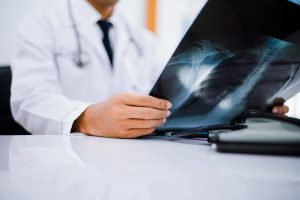Common Questions About Chest Pain After a Car Accident: Things to Know
Chest injuries after a car accident can be severe. They’re not always easy to spot and may not seem all that bad at first.
People want to know what might be causing their chest pain, what the symptoms of serious injury might be, how they’re going to pay for their medical bills, whether or not they should hire a personal injury attorney to help them get compensation, and what that process looks like (including how much it will cost them).
Let’s explore each of these below. If you’re looking for a specific answer to a question, use the table of contents to get there quickly.
What Causes Chest Pain after a Car Accident?
Blunt force trauma is the primary cause of chest pain following a car accident. When your vehicle collides with something else, it can cause you and other passengers to collide with objects within the vehicle, such as the steering wheel, dashboards, airbags, and even your own seat belt.

Seat Belt Injuries
Seat belts save lives. They keep your body from flying around in a vehicle during an accident and reduce the risk of you’ll be ejected from the vehicle.
Seat belts are also designed to lock up whenever brakes are applied to keep the sudden momentum changes in the vehicle from jolting the driver and other passengers.
This mechanism designed to save your life can also cause other injuries. It can cause bruising, cuts, broken rib bones, and even fractures to the sternum (the bone in the middle of your chest).
While broken bones aren’t always life-threatening, they can be painful and impact your ability to breathe. In more serious cases, a broken rib can puncture the lungs, heart, and other organs in the upper torso.
Injuries like these can take weeks to recover from. If you have serious injuries and have to undergo surgery or medical treatment of any kind, you should contact a personal injury attorney to see if you’re eligible for compensation.
Airbags
If you’ve been in a head-on collision, your airbag most likely deployed during the collision. Airbags save an estimated 2,790 lives per year, but they also deploy rapidly (1/20th of a second). If you’re too close when they deploy, the impact can cause serious injury.
The most chest common injuries caused by airbags deploying are:
- Abrasions
- Contusions
- Lacerations
- Broken ribs
- Internal injuries
- Internal bleeding
Important: Despite the fact that seat belts and airbags can cause injuries, that doesn’t mean you shouldn’t wear your seat belt or disable your airbag deployment systems. Seat belts and airbags save far more lives and prevent more injuries than they cause.
Getting Compensation Due to Chest Pain
Chest pain after a car accident may indicate a serious injury. At a minimum, it’s a sign something isn’t quite right. If you’re experiencing any of the following after a car accident, seek out medical attention first and then consult with a personal injury attorney to see what your options for compensation are.
Compensation is not just limited to chest pain either. You may receive compensation for hip pain, stomach pain, back pain, and more after a crash.
Broken Ribs
Signs of broken ribs include:
- Severe pain in the chest area
- Severe pain when breathing
- Sharp pains shooting through the rib cage with every heartbeat
- Increased pain when anything touches your ribs
- Increased pain when moving (such as twisting, coughing, laughing, & sneezing)
Muscle Damage
The muscles between your rib cage can be stretched and torn during a car accident. Pain due to muscle damage is usually less severe than a broken rib and will become more apparent whenever you’re doing things like lifting objects, laughing, sneezing, coughing, and taking deep breaths.

Lung Damage
In a motor vehicle accident, your lungs might be bruised, punctured, or collapsed. These lung injuries, like many other serious chest pains, can be fatal. Symptoms of injuries to the lungs include:
- Chest pain that increases with every breath you take
- Breathing problems such as shortness of breath
- Pain when coughing or sneezing
Heart Damage
There are several types of injuries that can happen to the heart during a car accident. The most common are cardiac contusions and heart attacks.
Cardiac Contusions
The heart can get bruised (myocardial contusion) from blunt force trauma, such as when a vehicle decelerates quickly, causing the body to impact other objects.
This is most common whenever the impact is serious enough to cause a broken rib or fractured sternum. Symptoms of a cardiac contusion include:
- Chest pain
- Arrhythmia (racing heart)
- Heart palpitations (feeling your heartbeat)
- Loss of consciousness
- Dizziness or lightheadedness
- Nausea
- Vomiting
- Coughing up blood
If you think you’ve suffered a cardiac contusion, seek emergency medical attention immediately. And if you received emergency care for chest injuries, be sure to speak with an attorney about filing a personal injury claim after your car accident.
Heart Attacks
A heart attack (myocardial infarction) is one of the most prevalent — and dangerous — causes of chest pain and discomfort (Mayo Clinic). A heart attack occurs when a portion of the heart’s blood supply is blocked. The lack of oxygen to the heart results in part of the heart dying.
Car accidents can cause heart attacks due to the stress that occurs during (and after) being involved in a collision.
Heart attack symptoms include:
- Chest pain
- Shortness of breath
- Weakness in the arms, legs, nausea
- Dizziness or lightheadedness
- Rapid or irregular heart rate (arrhythmia)
- Unconsciousness
Again, if you experience any of these symptoms after a car accident, seek medical attention immediately. If you received emergency care for your injuries, contact us about filing a personal injury claim.
How Do You Know if a Chest Injury is Serious?
The only way to know if you’ve been injured seriously enough to require treatment is to see a doctor for a thorough diagnosis. In certain circumstances, the shock and terror of the accident might hide signs of chest injuries until excruciating pain sets in.
Medical intervention is important here. Medical professionals will need to monitor your blood pressure, heart rate, and check for damage to your internal organs.
What to Do if You Have Chest Pains after a Car Accident
If you’re having chest pains following a vehicle accident, you should see a doctor right away. Intense pain in the chest region might be a sign of a severe chest injury that may lead to serious or fatal consequences if left untreated.
Left untreated, the long-term effects of a motor vehicle accident can result in astronomical medical expenses and loss of wages from being unable to work.
Getting medical care as soon as possible after a car accident can not only save your life but also help a personal injury attorney get the documentation they need to build the best case possible for you, including a medically accurate diagnosis of your injuries and records of the time your injury occurred.
You may be entitled to compensation for these as well as pain and suffering in certain circumstances. You can contact a personal injury lawyer to explore your options for recovering financial compensation.
How a Personal Injury Attorney Can Help
How you get compensation will depend on your situation and typically involves back and forth negotiation with insurance companies (who want to pay out the lowest amount possible).
The amount of insurance coverage drivers are required to carry varies by state. In Kentucky, for example, residents are required to carry personal injury protection (PIP) coverage on their auto insurance policy.
A personal injury attorney should step in before you begin any negotiations with an attorney about compensation for your damages if you want to increase your odds of getting the best offer possible.
In PIP states, the insurance coverage may not cover all of your medical expenses or long-term issues resulting from an injury. PIP also won’t fully compensate you for lost time, such as lost wages from being unable to work or time you lost from being with loved ones.
A personal injury attorney will handle all of the complicated steps involved in the process, such as collecting evidence, medical records and bills, and the itemization of your damages.
All you have to do is contact one of our attorneys at the Bryant Law Center and say you want help.
That’s it.
You don’t have to pay anything until we win or settle your case. Call today for a free consultation and get the answers you need.
